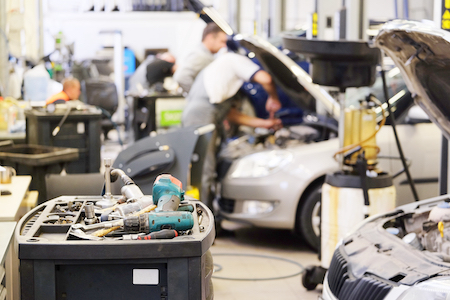When you’re living on a tight budget, bringing your car in for auto repairs can be a bit intimidating. What you thought would be a simple repair can quickly turn into an expensive overhaul.
But waiting isn’t an option either. If you ignore the warning signs, it’s a surefire way of letting the problem escalate. And you’ll have to face the problem sooner or later.
How do you handle auto repairs that pop up throughout the year … and stick to a budget too?
Start by finding a friend in the auto repair business
Finding a reliable auto mechanic can be daunting, especially if you are new to the area or not very familiar with car maintenance. However, with a little bit of research and due diligence, you can find a mechanic that you can trust to keep your car running smoothly. We often suggest:
Ask for recommendations: Ask friends, family, and coworkers for recommendations of mechanics they have used and trust. They may be able to provide valuable insight into the mechanic’s reliability, quality of work, and pricing.
Check online reviews: Look for online reviews of mechanics in your area. This can be a great way to get a sense of the mechanic’s reputation and the type of service they provide. Be sure to read multiple reviews from different sources to understand the mechanic better. You can also get a pretty good idea of who they are by looking at their website. How much thought and care do they put into making it shine?
Ask about the mechanic’s experience: It’s always a good idea to ask about the mechanic’s experience and training. A mechanic with more experience and training will likely have a deeper understanding of how cars work and be able to diagnose and fix problems more accurately.
Get estimates: Don’t be afraid to get estimates from multiple mechanics. This can help you compare prices and get a sense of what is a fair price for the work that needs to be done. Keep in mind that the lowest price may not always be the best deal, as cheaper mechanics may cut corners or use lower quality parts.
Trust your gut: Trust your instincts. If you get a good feeling about a mechanic and feel like they are trustworthy and competent, chances are they are. On the other hand, if you have a bad feeling about a mechanic, it’s probably best to look elsewhere.
How to tell the difference between auto repairs that need immediate action and those you can wait on
It is essential to properly maintain your vehicle to ensure its safe and efficient operation. However, some car repairs can be more pressing than others, and it is important to identify which ones should be addressed immediately and which ones can wait. Here are some tips on how to tell the difference:
Safety: If a repair poses a safety risk to you or other drivers, it should be addressed as soon as possible. For example, if your brakes are not functioning correctly, you should have them repaired immediately to avoid the risk of an accident.
Performance: If a repair is affecting your vehicle’s performance, it is generally best to address it sooner rather than later. For example, if your engine is misfiring or your transmission is slipping, these issues can lead to further damage if left unaddressed.
Cost: In some cases, it may be more cost-effective to address a repair sooner rather than later. For example, if a small oil leak is not addressed and it leads to further damage, the cost of the repair could be much higher than if the leak had been fixed initially.
Convenience: If a repair is causing inconvenience or discomfort, it may be worth addressing sooner rather than later. For example, if your air conditioning is not working, it may be more comfortable to have it fixed during the summer rather than waiting until the fall.
Frequency: If a problem occurs frequently, it is best to address it as soon as possible. For example, if you constantly have to refill your radiator with coolant, this could be a sign of a more significant issue that should be addressed.
A proactive approach to auto repair can be better for the budget
Being proactive with auto repairs means taking steps to prevent problems with your vehicle before they occur, or identifying and addressing issues as soon as they are detected. This can help you avoid costly repairs and downtime, and ensure that your vehicle is always running at its best.
There are several ways to be proactive with auto repairs:
Follow a regular maintenance schedule: Your vehicle’s manufacturer will likely provide a schedule for routine maintenance, such as oil changes and tire rotations. Following this schedule can help you catch minor problems before they become major issues.
Pay attention to warning signs: If your vehicle is exhibiting strange noises, smells, or behavior, don’t ignore it. These could be signs of an underlying issue that needs to be addressed.
Regularly check and maintain your vehicle: Regularly inspecting your vehicle for signs of wear and tear, and addressing any issues as soon as they are detected, can help prevent significant problems down the road.
Use high-quality parts and fluids: Using high-quality parts and fluids can help extend the life of your vehicle and prevent problems from occurring. Find a trusted mechanic, and you’ll never worry about inferior parts.
Keep records of repairs and maintenance: Keeping detailed records of all repairs and maintenance performed on your vehicle can help you identify patterns and issues, and make it easier to diagnose problems in the future.
By being proactive with auto repairs, you can help ensure that your vehicle stays in top condition and minimizes the risk of unexpected breakdowns. This can save you time, money, and hassle in the long run.
What’s your approach to auto repair?

